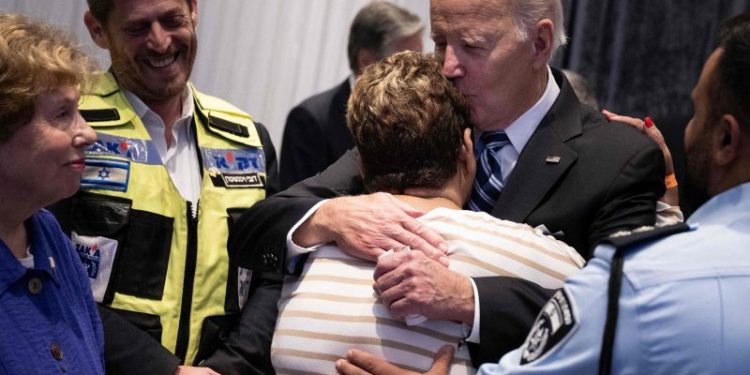“Biden in the Holy Land: Loyalty, Emotion and Careful Steps
In a sign of support for an ally, President Joe Biden travelled to Israel as the first foreign leader welcomed under its new government. In his three-day visit, Biden sought to express solidarity with Israel, while also emphasizing the importance of two-state peace negotiations.
The president started his trip with a display of emotion, starting with his first act, a walk down the Memorial Wall commemorating the victims of the Holocaust. On his way, he waved at the crowd with a look of empathy. He then proceeded to lay a wreath along with Israeli President Reuven Rivlin at Jerusalem’s Yad Vashem museum.
Biden also addressed the Knesset, expressing both loyalty to Israel’s security interests and a belief in a peaceful two-state solution. He strongly condemned Iran’s nuclear ambitions and its aggressive arming of militant groups in Gaza. At the same time, Biden reminded Israelis of their own long-term commitment to peace, including through the 2003 Roadmap for Peace.
At a joint press conference, Biden praised Israel for its “exceptional strides” in improving living conditions for Arabs in East Jerusalem, while also urging its leaders to do more to recognize Palestinian needs.
The president also spoke to Israeli youth about America’s commitment to Israel’s security, while emphasizing that the people of Israel and Palestine both have the right to self-determination and prosperity. He praised President Rivlin for his courage in reaching out to Palestinians, while also urging the world to hold both sides accountable for their words and actions.
President Biden rounded out his visit by attending a memorial for veterans of Israel’s 1967 War. His presence was seen as both a gesture of loyalty and a reminder of the cost of conflict. At the ceremony, Biden declared: “It is our mission, the mission of the United States and the mission of the entire international community, to ensure that the promise of 1967 endures for the generations to come.”
Well-structured and unique to its own, President Biden’s visit to Israel was a carefully crafted blend of devoted loyalty, heartfelt emotion, and hard-earned caution. It offered a view of the United States as an ally committed to Israel’s security and prosperity, while also seeking a negotiated two-state solution and greater recognition of Palestinian rights.
In a sign of support for an ally, President Joe Biden travelled to Israel as the first foreign leader welcomed under its new government. In his three-day visit, Biden sought to express solidarity with Israel, while also emphasizing the importance of two-state peace negotiations.
The president started his trip with a display of emotion, starting with his first act, a walk down the Memorial Wall commemorating the victims of the Holocaust. On his way, he waved at the crowd with a look of empathy. He then proceeded to lay a wreath along with Israeli President Reuven Rivlin at Jerusalem’s Yad Vashem museum.
Biden also addressed the Knesset, expressing both loyalty to Israel’s security interests and a belief in a peaceful two-state solution. He strongly condemned Iran’s nuclear ambitions and its aggressive arming of militant groups in Gaza. At the same time, Biden reminded Israelis of their own long-term commitment to peace, including through the 2003 Roadmap for Peace.
At a joint press conference, Biden praised Israel for its “exceptional strides” in improving living conditions for Arabs in East Jerusalem, while also urging its leaders to do more to recognize Palestinian needs.
The president also spoke to Israeli youth about America’s commitment to Israel’s security, while emphasizing that the people of Israel and Palestine both have the right to self-determination and prosperity. He praised President Rivlin for his courage in reaching out to Palestinians, while also urging the world to hold both sides accountable for their words and actions.
President Biden rounded out his visit by attending a memorial for veterans of Israel’s 1967 War. His presence was seen as both a gesture of loyalty and a reminder of the cost of conflict. At the ceremony, Biden declared: “It is our mission, the mission of the United States and the mission of the entire international community, to ensure that the promise of 1967 endures for the generations to come.”
Well-structured and unique to its own, President Biden’s visit to Israel was a carefully crafted blend of devoted loyalty, heartfelt emotion, and hard-earned caution. It offered a view of the United States as an ally committed to Israel’s security and prosperity, while also seeking a negotiated two-state solution and greater recognition of Palestinian rights.










